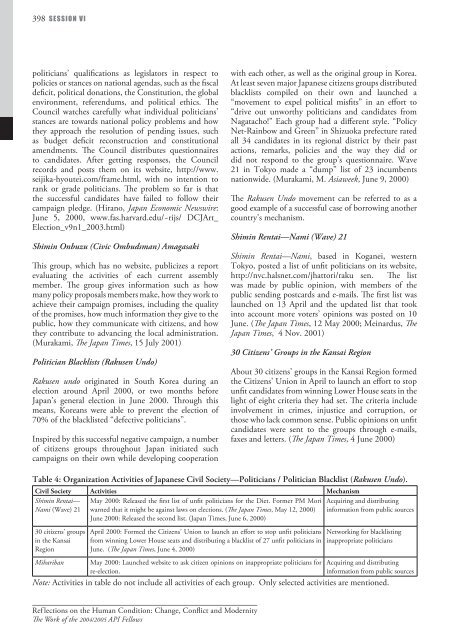Reflections on the Human Condition - Api-fellowships.org
Reflections on the Human Condition - Api-fellowships.org
Reflections on the Human Condition - Api-fellowships.org
Create successful ePaper yourself
Turn your PDF publications into a flip-book with our unique Google optimized e-Paper software.
398 SESSION VI<br />
politicians’ qualificati<strong>on</strong>s as legislators in respect to<br />
policies or stances <strong>on</strong> nati<strong>on</strong>al agendas, such as <strong>the</strong> fiscal<br />
deficit, political d<strong>on</strong>ati<strong>on</strong>s, <strong>the</strong> C<strong>on</strong>stituti<strong>on</strong>, <strong>the</strong> global<br />
envir<strong>on</strong>ment, referendums, and political ethics. The<br />
Council watches carefully what individual politicians’<br />
stances are towards nati<strong>on</strong>al policy problems and how<br />
<strong>the</strong>y approach <strong>the</strong> resoluti<strong>on</strong> of pending issues, such<br />
as budget deficit rec<strong>on</strong>structi<strong>on</strong> and c<strong>on</strong>stituti<strong>on</strong>al<br />
amendments. The Council distributes questi<strong>on</strong>naires<br />
to candidates. After getting resp<strong>on</strong>ses, <strong>the</strong> Council<br />
records and posts <strong>the</strong>m <strong>on</strong> its website, http://www.<br />
seijika-hyoutei.com/frame.html, with no intenti<strong>on</strong> to<br />
rank or grade politicians. The problem so far is that<br />
<strong>the</strong> successful candidates have failed to follow <strong>the</strong>ir<br />
campaign pledge. (Hirano, Japan Ec<strong>on</strong>omic Newswire:<br />
June 5, 2000, www.fas.harvard.edu/~rijs/ DCJArt_<br />
Electi<strong>on</strong>_v9n1_2003.html)<br />
Shimin Onbuzu (Civic Ombudsman) Amagasaki<br />
This group, which has no website, publicizes a report<br />
evaluating <strong>the</strong> activities of each current assembly<br />
member. The group gives informati<strong>on</strong> such as how<br />
many policy proposals members make, how <strong>the</strong>y work to<br />
achieve <strong>the</strong>ir campaign promises, including <strong>the</strong> quality<br />
of <strong>the</strong> promises, how much informati<strong>on</strong> <strong>the</strong>y give to <strong>the</strong><br />
public, how <strong>the</strong>y communicate with citizens, and how<br />
<strong>the</strong>y c<strong>on</strong>tribute to advancing <strong>the</strong> local administrati<strong>on</strong>.<br />
(Murakami, The Japan Times, 15 July 2001)<br />
Politician Blacklists (Rakusen Undo)<br />
Rakusen undo originated in South Korea during an<br />
electi<strong>on</strong> around April 2000, or two m<strong>on</strong>ths before<br />
Japan’s general electi<strong>on</strong> in June 2000. Through this<br />
means, Koreans were able to prevent <strong>the</strong> electi<strong>on</strong> of<br />
70% of <strong>the</strong> blacklisted “defective politicians”.<br />
Inspired by this successful negative campaign, a number<br />
of citizens groups throughout Japan initiated such<br />
campaigns <strong>on</strong> <strong>the</strong>ir own while developing cooperati<strong>on</strong><br />
Ref lecti<strong>on</strong>s <strong>on</strong> <strong>the</strong> <strong>Human</strong> C<strong>on</strong>diti<strong>on</strong>: Change, C<strong>on</strong>flict and Modernity<br />
The Work of <strong>the</strong> 2004/2005 API Fellows<br />
with each o<strong>the</strong>r, as well as <strong>the</strong> original group in Korea.<br />
At least seven major Japanese citizens groups distributed<br />
blacklists compiled <strong>on</strong> <strong>the</strong>ir own and launched a<br />
“movement to expel political misfits” in an effort to<br />
“drive out unworthy politicians and candidates from<br />
Nagatacho!” Each group had a different style. “Policy<br />
Net-Rainbow and Green” in Shizuoka prefecture rated<br />
all 34 candidates in its regi<strong>on</strong>al district by <strong>the</strong>ir past<br />
acti<strong>on</strong>s, remarks, policies and <strong>the</strong> way <strong>the</strong>y did or<br />
did not resp<strong>on</strong>d to <strong>the</strong> group’s questi<strong>on</strong>naire. Wave<br />
21 in Tokyo made a “dump” list of 23 incumbents<br />
nati<strong>on</strong>wide. (Murakami, M. Asiaweek, June 9, 2000)<br />
The Rakusen Undo movement can be referred to as a<br />
good example of a successful case of borrowing ano<strong>the</strong>r<br />
country’s mechanism.<br />
Shimin Rentai—Nami (Wave) 21<br />
Shimin Rentai—Nami, based in Koganei, western<br />
Tokyo, posted a list of unfit politicians <strong>on</strong> its website,<br />
http://nvc.halsnet.com/jhattori/raku sen. The list<br />
was made by public opini<strong>on</strong>, with members of <strong>the</strong><br />
public sending postcards and e-mails. The first list was<br />
launched <strong>on</strong> 13 April and <strong>the</strong> updated list that took<br />
into account more voters’ opini<strong>on</strong>s was posted <strong>on</strong> 10<br />
June. (The Japan Times, 12 May 2000; Meinardus, The<br />
Japan Times, 4 Nov. 2001)<br />
30 Citizens’ Groups in <strong>the</strong> Kansai Regi<strong>on</strong><br />
About 30 citizens’ groups in <strong>the</strong> Kansai Regi<strong>on</strong> formed<br />
<strong>the</strong> Citizens’ Uni<strong>on</strong> in April to launch an effort to stop<br />
unfit candidates from winning Lower House seats in <strong>the</strong><br />
light of eight criteria <strong>the</strong>y had set. The criteria include<br />
involvement in crimes, injustice and corrupti<strong>on</strong>, or<br />
those who lack comm<strong>on</strong> sense. Public opini<strong>on</strong>s <strong>on</strong> unfit<br />
candidates were sent to <strong>the</strong> groups through e-mails,<br />
faxes and letters. (The Japan Times, 4 June 2000)<br />
Table 4: Organizati<strong>on</strong> Activities of Japanese Civil Society—Politicians / Politician Blacklist (Rakusen Undo).<br />
Civil Society Activities Mechanism<br />
Shimin Rentai—<br />
Nami (Wave) 21<br />
30 citizens’ groups<br />
in <strong>the</strong> Kansai<br />
Regi<strong>on</strong><br />
May 2000: Released <strong>the</strong> first list of unfit politicians for <strong>the</strong> Diet. Former PM Mori<br />
warned that it might be against laws <strong>on</strong> electi<strong>on</strong>s. (The Japan Times, May 12, 2000)<br />
June 2000: Released <strong>the</strong> sec<strong>on</strong>d list. (Japan Times, June 6, 2000)<br />
April 2000: Formed <strong>the</strong> Citizens’ Uni<strong>on</strong> to launch an effort to stop unfit politicians<br />
from winning Lower House seats and distributing a blacklist of 27 unfit politicians in<br />
June. (The Japan Times, June 4, 2000)<br />
Mihariban May 2000: Launched website to ask citizen opini<strong>on</strong>s <strong>on</strong> inappropriate politicians for<br />
re-electi<strong>on</strong>.<br />
Acquiring and distributing<br />
informati<strong>on</strong> from public sources<br />
Networking for blacklisting<br />
inappropriate politicians<br />
Acquiring and distributing<br />
informati<strong>on</strong> from public sources<br />
Note: Activities in table do not include all activities of each group. Only selected activities are menti<strong>on</strong>ed.

















